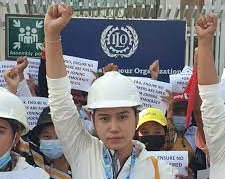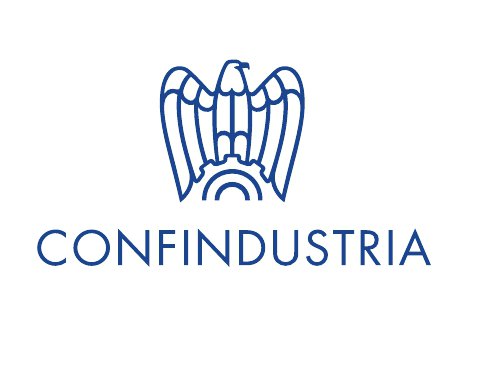Fashion brands should urgently move production out of Myanmar if they cannot guarantee protection for workers in the country’s factories, says @voguebusiness [Myanmar: Time for fashion brands to exit?] commenting on the Business & Human Rights Resource Centre's labour and human rights report. [Resistance, harassment and intimidation: Garment worker abuse under Myanmar's military rule – BHRC]
Workers are facing a flood of labour and human rights abuses following the military takeover in February 2021, according to the Resistance, harassment and intimidation: Garment worker abuse under Myanmar's military rule report published today by the Business & Human Rights Resource Centre (BHRC), a global NGO with offices in London and New York.
The BHRC developed a Myanmar Garment Worker Allegations Tracker, which documents more than 100 cases of labour and human rights violations involving at least 60,800 garment workers. They include 55 cases of reduced wages and wage theft; 35 cases of abusive work rates and mandatory overtime; 28 cases of gender-based violence and harassment; 15 cases of arbitrary arrest and detention of workers; and reports of seven garment workers killed by the military. There have been 31 attacks against freedom of association, with at least 55 trade union activists killed and 301 union leaders and members of the labour movement arrested.
Background information on garment sector
Myanmar’s garment industry employs over 700,000 people and accounts for nearly 10% of all exports. Myanmar’s minimum wages are among the lowest in the region and lower than its garment producing neighbours such as China, Cambodia and Vietnam. Close to 90% of the garment workforce is made up of women. The monthly minimum wage stands at 144,000 (US$95),which falls far short of the estimated living wage of 5,16,312 Kyat (US$367) per month. Some garment workers are also eligible for bonuses, including seniority, skills, productivity and attendance bonuses, however workers’ wages are also often subject to deductions for social security fees, hostel accommodation, food and transport.
The European Union accounts for 70% of Myanmar’s garment exports, however the European Commission is considering whether to withdraw tariff preferences granted to Myanmar under the European Union's Everything But Arms' (EBA) trade scheme in response to accusations against the Myanmar military by UN officials and NGOs of persecuting the Rohingya in northern Rakhine. A monitoring mission scheduled to visit Myanmar last summer, to review the human rights situation and the government’s willingness to change course, was postponed due to the COVID-19 pandemic. The status of this mission is unclear following the coup.
On 1 February 2021, the Myanmar military seized power in a coup d’état, overthrowing the country’s democratically elected government and detaining the leaders of the National League for Democracy (NLD) Party, including its leader Aung San Suu Kyi and President U Win Myint, along with cabinet ministers, opposition parliamentarians and activists. (The NLD won a landslide victory in November’s elections, securing 396 out of 476 seats, which granted it a further five years in government. The military-backed Union Solidarity and Development party won just 33 seats).
Since then, garment workers – mostly women – have been on the front line of the country’s Civil Disobedience Movement, risking their lives and livelihoods to demand an end to the dictatorship and to restore democracy in Myanmar. To maintain power, the military has responded with deadly force to opposition and dissent.
The Report
Through collaboration with partners and allies inside and outside the country, Business & Human Rights Resource Centre has been monitoring the significant increase in labour and human rights abuses of garment workers across the country since the military takeover. This cooperation has enabled the creation of our Myanmar allegations tracker, which has so far captured over 100 cases of alleged labour and human rights abuse perpetrated against at least 60,800 garment workers, revealing widespread and systemic abuse of garment workers in international brands’ supply chains. These workers are employed at 70 factories producing for at least 32 global fashion brands and retailers, including adidas, Bestseller, C&A, Inditex (Zara & Bershka), Fast Retailing (GU), GUESS, H&M, Lidl, Next, Matalan and Primark.
The data highlights the scale and scope of abuse in the 18 months since the military seized power and the widespread impunity enjoyed by perpetrators. It raises serious questions for apparel brands and their investors regarding their ability to source responsibly, conduct human rights due diligence and protect workers in their supply chain. Wage theft, inhumane work rates and mandatory overtime, and attacks on freedom of association are the most frequently recorded types of abuses. Cases also include killings, arrest and arbitrary detention of workers by the military, gender-based violence and harassment, mandatory overtime and child labour. The cases are likely the tip of the iceberg, given the severe restrictions on civic freedoms and reporting under the military rule and risk of reprisals for workers who speak out against abuse.
- There have been workers violations on many counts. Workers have to work overtime… and endure verbal harassment and abuse... To fulfil the impossible targets set, we do not even have time to go to the toilet… We want the brands to know that workers are pressured by the factory to say good words when they contact the workers. We want the brands to know the reality on the ground. There is no way the workers could make a proper living with... the current salar[ies]...
- Garment worker at Huabo Times factory, March 2022
Despite calls from local and international unions for international brands to withdraw from Myanmar until democracy is restored, only two companies (Tesco and ALDI South) have exited. Labour groups argue brands which remain in Myanmar are benefiting from labour rights repression under military rule and prioritising profits over human rights, in a jurisdiction where garment workers – 90% of them women – are now earning less than US$2 a day. In these circumstances, apparel brands must remember inaction is not an option: at a minimum, they must undertake heightened, ongoing human rights due diligence to determine whether they are able to responsibly source from Myanmar suppliers; where they are not, responsible exit strategies should be considered to abide by the international standards brands have adopted.
Workers reveal the reality
“We want the brands to know that workers are pressured by the factory to say good words when they contact [them],” said an employee at Huabo Times factory in a statement. “We want the brands to know the reality on the ground. There is no way the workers could make a proper living with the current salaries.” Workers are reported to typically earn less than $2 a day.
The military seized control of Myanmar in 2021 after a decade of democracy. Opposition activists formed the Campaign for Civil Disobedience and organised mass protests, which were repressed. The report highlights how many of Myanmar’s garment workers — 90 per cent of whom are women — have been on the frontline of the civil disobedience movement.
A bleak perspective was shared with the report authors. “We have tried hard to protect jobs and workers’ rights. But with every passing month, we see the military dictatorship is not disappearing. On the contrary, they are trying to buy time to strengthen and consolidate their rule,” said Khaing Zar, president of the Industrial Workers’ Federation of Myanmar. “It is important that we contribute to their immediate and permanent defeat… It is our moral duty to make difficult decisions that will shorten the suffering of our people.”
The research also suggests a connection between some garment factories and the military. It alleges that 15 per cent of recorded abuse allegations were the result of factory-military collusion. Workers have reported that factories are working with the military to arrest union leaders. Intimidation is rife. “Factories have taken advantage of the dictatorship to roll back the hard-won labour rights and protections unions have been fighting for over the past two decades,” says Khambay of the BHRC. “Almost all union leaders have now been forced into hiding.”



